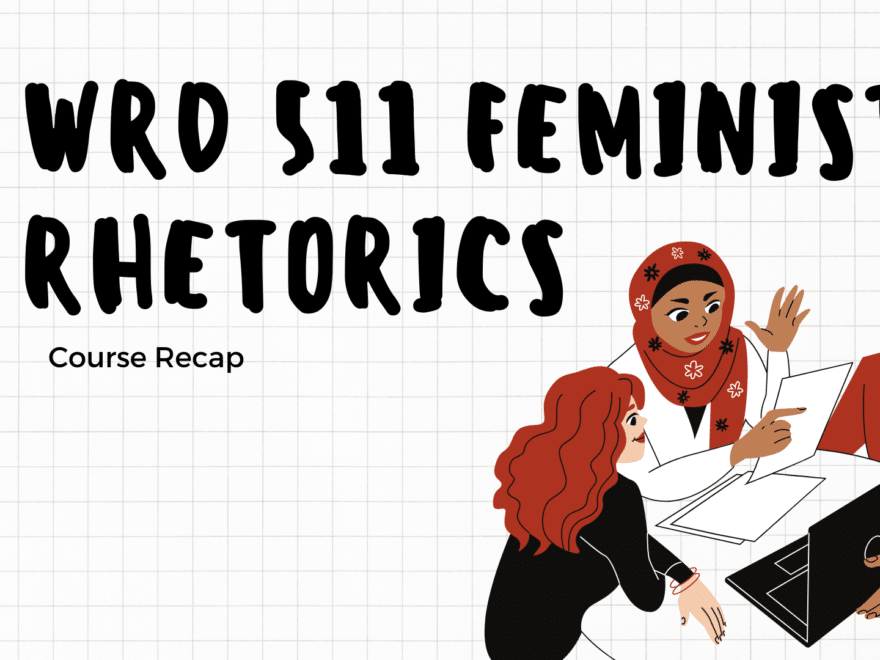Students of rhetoric and discourse can tell you that both are steeped in language that can be highly problematic. One of the ways we can combat that is by studying topics such as Feminist Rhetorics (WRD 511) with Dr. Monica Reyes. In this class, you strive to answer a variety of questions such as: What are the major debates in feminist rhetorical scholarship and practice? How has feminist rhetorical scholarship engaged and intersected with questions of race, sexuality, class, age, and disability studies? How does one undertake a feminist rhetorical analysis? How is feminism playing out in everyday life, popular culture, and activist communities?
Whether we were interrogating ideas long held in the worlds of rhetoric and discourse or seeing how we could each disrupt the status quo in feminist scholarship, Feminist Rhetorics was always a fun class to be part of. So between myself and fellow classmate Kristin Fleming, we reflected on our times in this class and how it impacted the way we view our roles in academia.
What drew you to this class?
Kristin: I was drawn to the class partly because of Monica, but also because I wanted to learn how to be a better intersectional feminist. I knew some of the scholarship before the class but felt like I didn’t know enough to “walk the walk” as a white woman who wants to do better.
Amanda: Monica’s classes are always a lot of fun to be in and I always learn so much from her. More than that, I was curious about how feminist rhetorics plays a role in this field. Knowing the historical as well as present-day contexts of feminist rhetorics would also be able to help with intersectional study, so I signed up for this course.
What was the most valuable thing you learned?
Kristin: The most valuable thing I learned was the concept of rhetorical healing. While words can be some [of] the most dangerous tools, they can also be some of the most therapeutic. The relationship between rhetorical healing and women of color was fascinating—seeing people harness the very tools used to try and take them down is empowering.
Amanda: Just like in the Women and Gender Studies classes I’ve taken, I’m usually drawn to queer scholarship. I was particularly interested in seeing the ways in which the feminist and queer communities intersect in rhetorical study. Learning that they were closely tied to one another made me more confident in my own rhetoric studies and concentrations.
What did you develop for your final project?
Kristin: For my project, I took a look at female criminals and how typically negative stereotypes were utilized in their favor. I looked at a few infamous women (like Lorena Bobbitt) to see how being the damsel in distress, while appearing to be a submissive role, was subverted to defend herself.
Amanda: I developed a template and modus operandi for a feminist, rhetorical study that I will be conducting in Germany in mid-May. Being able to put the readings for this class to good use with a project I was planning out anyway was a really great opportunity to dig into my research. I’m really grateful I had that space to play around with my research methodologies.
Are you interested in doing more work on your project in the future?
Kristin: I am trying to do more with my project! I am doing another true-crime type piece in my Science Writing class and I plan to use some of [the] information I found to incorporate into my new article. I also would like to be able to expand my project in the future, word counts and I never get along so I feel like I could still write pages about the topic.
Amanda: I am! I used the work I did in the final project to inform the ways in which I prepare for this week-long interview and research-focused trip to Germany. Having the space to play around with my research gave me the chance to dismiss certain things or dig deeper into other topics. The class became a safe space to experiment with ideas.
Whether you are looking to expand your rhetorical horizons or just be a more informed feminist, this class will fulfill and exceed your expectations.
